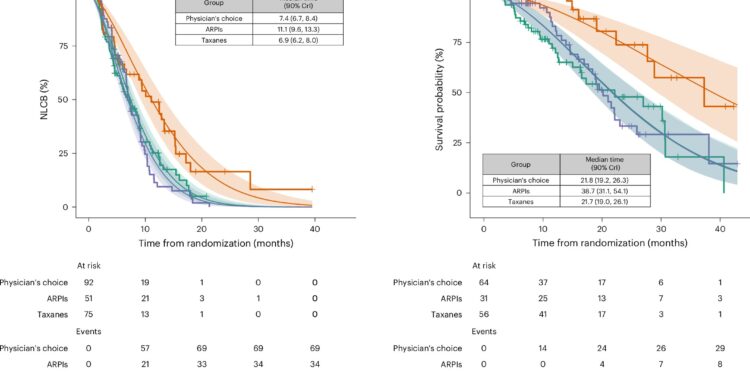Time to NLCB and overall survival. Credit: Natural medicine (2024). DOI: 10.1038/s41591-024-03204-2
Men with metastatic castration-resistant prostate cancer should be treated first with second-generation hormonal drugs, which offer a better response to treatment and a longer life expectancy than chemotherapy. However, the effect depends on the mutations the patient’s tumor carries. These findings are the result of the ProBio study, led by researchers at Karolinska Institutet in Sweden. The study is published in Natural medicine.
Every year, about 2,500 men in Sweden are diagnosed with metastatic prostate cancer. Initially, all are treated with testosterone blockers to prevent testosterone from activating the androgen receptor, the gene that primarily fuels the growth of cancer cells.
Over time, cancer cells develop resistance and become what are called castration-resistant cells. This requires the use of new drugs, usually chemotherapy or second-generation hormonal drugs (abiraterone/enzalutamide) that block the androgen receptor. These are called androgen receptor pathway inhibitors, or ARPis.
Although these drugs have been available for more than a decade, there is no direct comparison from a randomized trial to date.
Personalized treatment
“For the first time, we have compared these treatments with each other and also analyzed the DNA of the cancer cells to find out which drug works best for different people,” says Johan Lindberg, senior researcher at the Department of Medical Epidemiology and Biostatistics (MEB) at Karolinska Institutet.
The bloodstream contains so-called free DNA from dead cells, which occurs all the time in healthy people and is perfectly normal. In cancer patients, a fraction of the free DNA comes from cancer cells and is called circulating tumor DNA (ctDNA). By analyzing ctDNA, it is possible to see what changes, or mutations, are present in a person’s tumor.
The ProBio study aims to use knowledge of the tumor’s genetic signature to propose the best treatment. The idea is to be able to identify patients whose tumors are particularly sensitive or resistant to certain treatments through continuous analyses.
“This is a self-learning system that can continuously improve the treatment of men with metastatic prostate cancer,” says Martin Eklund, professor of epidemiology in the same department. “We are also collecting information about regions of the genome that are important in prostate cancer.”
Longer life expectancy
The current substudy involved 193 patients with metastatic castration-resistant prostate cancer. They were randomly assigned to receive either chemotherapy or an ARPi, which was compared to a control group where the doctor decided which treatment was best.
The ARPi group responded the longest to treatment (a median of 11.1 months versus 6.9 months for chemotherapy and 7.4 months for the control group). Survival in the ARPi group was also significantly longer, with a median of 38.7 months versus 21.7 months and 21.8 months, respectively.
The effectiveness of ARPi varies depending on the patient’s genetic profile. For example, no significant short-term differences were observed between treatments in patients whose tumors had mutations in the p53 gene, which is present in about 45% of men with metastatic prostate cancer. However, the study data suggest that this group may also have better survival if they receive ARPi rather than chemotherapy.
The best treatment
“Our study shows that it is possible to ensure that each patient receives the best treatment based on the genetic profile of the tumor,” says Henrik Grönberg, Professor of Cancer Epidemiology, MEB, Karolinska Institutet. “Everyone talks about precision medicine, but studies like ProBio are needed to understand how biomarkers can help patients.”
ProBio involves researchers and doctors from 31 hospitals, 10 of which are in Sweden and the rest in Belgium, Norway and Switzerland.
More information:
Bram De Laere et al, Androgen receptor pathway inhibitors and taxanes in metastatic prostate cancer: a randomized outcome-adaptive trial, Natural medicine (2024). DOI: 10.1038/s41591-024-03204-2
Provided by the Karolinska Institute
Quote:Precision therapy for metastatic prostate cancer offers improved survival (2024, August 20) retrieved August 20, 2024 from
This document is subject to copyright. Apart from any fair dealing for the purpose of private study or research, no part may be reproduced without written permission. The content is provided for informational purposes only.



